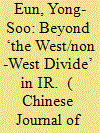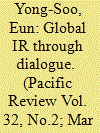| Srl | Item |
| 1 |
ID:
162638


|
|
|
|
|
| Summary/Abstract |
Since the publication a decade ago of Acharya and Buzan’s seminal forum, ‘Why is there no non-Western IR theory?’, voluminous studies have attempted to ameliorate the Western parochialism of international relations (IR) studies. This trend includes a strong and increasing commitment among non-Western (in particular, Chinese) IR scholars to the development of ‘national schools’. However, Acharya and Buzan point out that non-Western IR theory-building enterprise ‘cannot be a conversation among the likeminded’. They add: the project ‘is more likely to fail if it does not draw in the broadest group of scholars, including those in the Western mainstream’. In a related vein, Peter Katzenstein writes that the diversity and heterogeneity of world politics cannot be captured by binary distinctions between Western and non-Western IR theory. Rather, our focus, he notes, should be on interactions between different types of knowledge. In short, we need a two-way ‘dialogue’ across ‘the West/non-West divide’ to transform the current Western-centric IR into a global discipline. A critical question, then, is how we can ensure such a dialogue without descending into a narcissistic turf war. This article tackles the how-question head-on in its discussions of the diverse kinds and properties of dialogue.
|
|
|
|
|
|
|
|
|
|
|
|
|
|
|
|
| 2 |
ID:
165148


|
|
|
|
|
| Summary/Abstract |
This article aims to address how to ensure a two-way ‘dialogue’ across ‘the West/non-West distinction’ in international studies. To this end, I first discuss three different approaches to dialogue, the Socratic, the Habermasian, and the Weberian, and clarify what kind of thing dialogue should be if it is to overcome the ‘West-non-West divide’ and transform the current ‘Western-centric’ IR into a global discipline. I argue that dialogue should be understood as reciprocal feedback from different perspectives for mutual learning. In order to achieve this goal (i.e. mutual learning), I call for an ‘instrumentalist’ approach to dialogue. To elucidate this point, I offer an empirical illustration. The focus here is on dialogue as mutual learning between Western-centric IR theory, more specifically constructivism, and the indigenous experience and knowledge of East Asia.
|
|
|
|
|
|
|
|
|
|
|
|
|
|
|
|